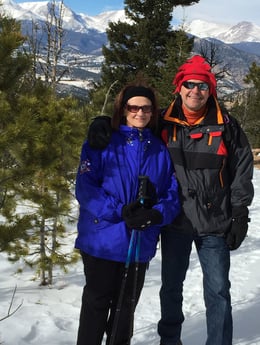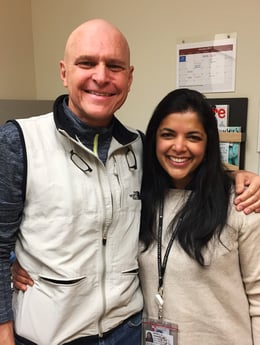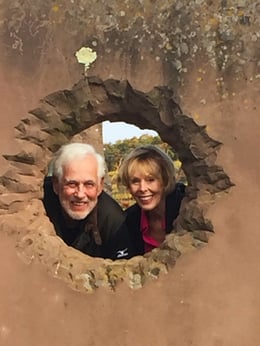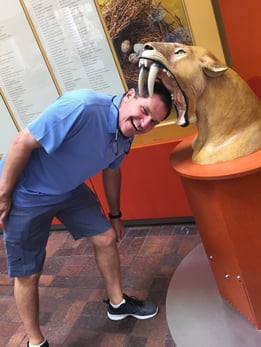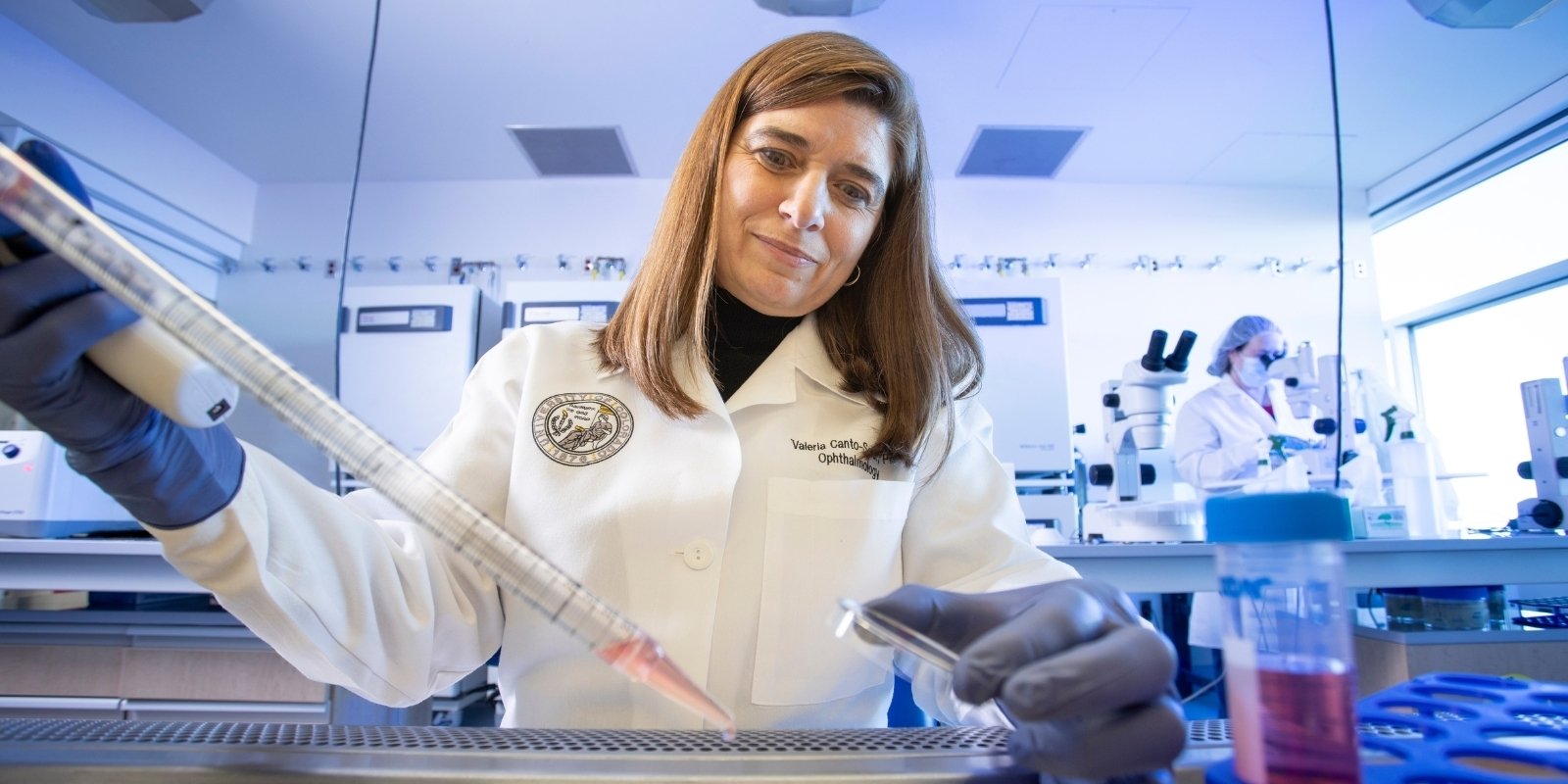From “No Hair Don’t Care” to “Keep Calm and Colorado On,” four friends facing two grim diagnoses used humor and grit in their battles against cancer. All four contend that, without their outlook and a little fate, their crusade might have had a different ending.
Sue and Pat Krummrei find
medicine in the outdoors.
Since their first golf tournament together as a foursome more than three decades ago in Germany, Sue and Pat Krummrei and Mary Hartmann and Lee Kirsch have hiked, biked and traveled the world together, living a life fueled by fitness and fun.
So it was no surprise that when the Krummreis retired from Germany to Sue Krummrei’s childhood state of Colorado, their friends were right behind.
“It was the reason for the overall success,” Sue Krummrei said of being within treatment distance of the University of Colorado Anschutz Medical Campus and its internationally recognized CU Cancer Center when her husband and friend’s diagnoses came. “We have talked about this so many times: the serendipity of us coming back here.”
Fitness deepens ‘cruel cut’
Pat Krummrei’s cancer diagnosis came first, in May 2016, after weight loss, night sweats and intense pain in his left side tipped the couple off that something was terribly wrong. Always physically fit and health conscious, the news was a particularly “cruel cut,” Sue Krummrei said.
Words that stood out after an enlarged spleen led to a mantle cell lymphoma diagnosis were “incurable,” “rare,” “aggressive” and “stage IV,” Sue Krummrei said.
“I’m not going to lie,” Pat Krummrei said. “The first day was pretty devastating. I was pretty angry,” he said of hearing the diagnosis at the UCHealth Medical Center of the Rockies near his Greeley home.
But then their doctor sent the Krummreis to UCHealth University of Colorado Hospital and Manali Kamdar, MD, clinical director of lymphoma services at the CU Cancer Center, who would be the ringleader of his care during the months ahead. And their attitudes changed.
A winning team: Pat Krummrei
and Dr. Manali Kamdar
‘We are going to be OK’
“She knew everything about me when I walked into that office,” Pat Krummrei said. Kamdar spelled out the challenges and the treatment plan in detail, he said. “It made it a lot easier.”
“The first day we met Dr. Kamdar, she rolled up in her chair, knee to knee with Pat, and she rattled off all of this information without looking at a screen or clipboard,” Sue Krummrei said. “And in that moment, I went: We are going to be OK. She was phenomenal,” she said of Kamdar, an expert in rare lymphomas.
At University of Colorado Hospital, a 30-plus-person multidisciplinary team builds a personalized treatment plan for every patient, offering the most advanced cancer care by top specialists from the CU Cancer Center, the state’s only NCI-designated comprehensive cancer center.
In addition to the quality care, friendship made a difference, Pat Krummrei said. Through the chemotherapy and immunotherapy infusions and an eventual bone-marrow transplant, Hartmann and Kirsch were there “every step of the way,” even beating the Krummreis to the hospital that day of diagnosis, he said.
‘No Hair Don’t Care’
The friends also came with humor and positive thoughts, generally sporting their “Keep Calm and Colorado On” T-shirts Sue Krummrei found for friends and family as a show of solidarity and their commitment to maintaining their lifestyles.
During his bone-marrow transplant, requiring weeks in UCHealth University of Colorado Hospital on the Anschutz Medical Campus, Pat Krummrei’s wife and friends decked the walls with T-shirts bearing slogans that revealed their mindsets: “No Hair Don’t Care” and “Cancer Sucks.”
Their positive (and sometimes flippant) attitudes worked for Pat Krummrei, whose new bone marrow fully grafted and left him with no signs of cancer in 2018. But the party was short-lived.
“As we were celebrating Pat's good news, Mary was diagnosed with stage III metastatic ovarian cancer,” Sue Krummrei said. “She has gone through two years of grueling therapies and surgeries under the extraordinary care of her oncology team at CU Anschutz.”
Lee Kirsch and Mary Hartmann:
it's all about fun.
Tables turn; support remains
Hartmann’s cancer was diagnosed after an enlarged spleen made breathing so difficult, she ended up in the emergency room. Her treatment plan was tough, but her support group was there.
“I think we are all pretty optimistic,” Kirsch said. “But Pat is uber optimistic. I think his optimism inspired us and keeps us fired up.”
Pat Krummrei shared his “you are going to beat it” attitude with Hartmann, as well as his diet, acupuncture and therapeutic massage regimen he began including to improve his odds.
All doctors, including Kamdar and Hartmann’s chief CU School of Medicine providers, Kian Behbakht, MD, a pioneer in ovarian cancer care, and Bradley Corr, MD, a gynecologic oncologist, acknowledged the benefit of the pair’s health-focused lifestyles in their battles, they said.
“She’s been into this for two and a half years, and never ever let up,” Sue Krummrei said of Hartmann, adding that her friend never stopped entertaining, traveling, exercising, being outdoors and dressing up (even for chemotherapy treatments).
“Both Pat and Mary were determined to power through this, whatever it takes,” she said. “I think they are the ideal patients to align with the philosophy of care at Anschutz,” Krummrei said, referring to the care and compassion the four experienced across the medical campus, from the hospital to the cancer center.
Pat Krummrei recalled Kamdar’s response when he expressed worries about traveling soon after his diagnosis. “She told me: ‘You need to live your life. Don’t step down because you have this. Stay positive.’ And that’s what I did,” he said.
‘If I lived on the South Pole…’
Cancer didn't steal Pat Krummrei's
sense of humor.
When Hartmann’s therapy stopped working, her doctors didn’t, enrolling her in a clinical trial last January. “Several weeks ago, the doctor came in and said: ‘I have phenomenal news for you,’” Hartmann said. “He said that my CT scan was clear. The trial was a success.”
Looking back, the friends say their experience with the CU Anschutz Medical Campus and UCHealth made the dark times in their lives brighter.
Both couples said the fact that they could do some of their chemotherapy treatments closer to home at other UCHealth hospitals, while still under the direction of the CU Cancer Center experts, was a benefit.
All employees – from medical assistants to laboratory techs and from nurses to the housekeeping crew – were outstanding, the four said. “If I lived on the South Pole, and I had a problem, I would come to Anschutz,” she said. “They were a remarkable team, from start to finish.”
The four are already planning a celebratory trip back to Germany, with no intent on slowing down on the golfing, skiing and hiking. They will only enjoy their playtime more now, Sue Krummrei said. “Life is good. It’s precarious. You have to enjoy every opportunity you get.”
September marks Ovarian Cancer Awareness and Lymphoma Awareness months
Signs and Symptoms
Ovarian cancer
- Bloating
- Pelvic or abdominal (belly) pain
- Trouble eating or feeling full quickly
- Urinary urgency or frequency
- Fatigue (extreme tiredness)
- Back pain
- Abdominal swelling with weight loss
- Pain during sex
- Constipation
- Changes in menstrual cycle
“If I lived on the South Pole, and I had a problem, I would come to Anschutz. They were a remarkable team, from start to finish.” – Sue Krummrei
Mantle Cell Lymphoma (MCL)
- Loss of appetite and weight
- Fever
- Night sweats
- Nausea or vomiting
- Swollen lymph nodes in your neck, armpits, or groin
- Heartburn, belly pain, or bloating
- A sense of fullness or discomfort from enlarged tonsils, liver, or spleen
- Pressure or pain in the lower back, often going down one or both legs
- Fatigue

